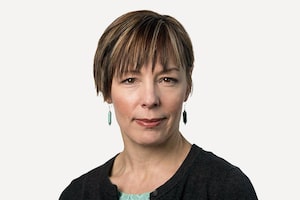
An empty playground in a schoolyard is shown during the COVID-19 pandemic in Toronto on Wednesday, Feb. 3, 2021.Nathan Denette/The Canadian Press
Rebecca Steinhoff’s boys had their school bags packed, eager to return to their classrooms this week after winter break in Ontario.
On Monday, they found out that they, like all the province’s primary and secondary students, will instead be learning online until at least Jan. 17.
“It is going to be chaos here,” said Ms. Steinhoff, a social worker who lives in Courtice, about 60 kilometres east of Toronto.
Parents and children around the country have had to absorb similarly abrupt changes in recent weeks, as provinces bring in new restrictions to thwart the spread of the highly contagious Omicron variant of COVID-19. After nearly two years of intermittent pandemic measures, the disruptions are taking their toll.
Ontario businesses, workers ‘disappointed’ in new round of closures, capacity limits
Ontario’s move to online learning is the same as Quebec which has also gone remote to Jan. 17. It is more severe than British Columbia, Alberta, Nova Scotia and Manitoba, which have all announced week-long extensions to winter breaks for their primary and secondary students. Newfoundland and Labrador, meanwhile, is switching to online learning starting on Jan. 4. The changes are intended to give schools time to make adjustments that will help them prevent viral transmission among students and staff.
The Steinhoffs sat together and watched Ontario Premier Doug Ford announce the latest COVID-19 measures in a televised news conference on Monday morning. When it was over, Ms. Steinhoff’s sons – she has five of them, three of whom are old enough for school – asked her if they will ever be back in class. “We’re in a privileged position where I don’t have to scramble for child care like friends that I know,” Ms. Steinhoff said. “But mentally, my kids are not handling this. They are devastated.”
On Monday, Mr. Ford said his Education Minister, Stephen Lecce, has sent 11 million rapid antigen COVID-19 test kits to schools, and has “done everything in his power to ensure schools can move forward throughout this pandemic. He’s made sure that we have N95 masks for educators, which is unheard of, by the way. There is no jurisdiction in Canada that has N95 masks.” Public-health experts consider such masks to be more effective protection than face coverings made of cloth or other materials.
But Karen Brown, president of the Elementary Teachers’ Federation of Ontario, said Monday’s online-learning announcement does not go far enough. She called for additional measures, including vaccine booster shots for teachers and HEPA filters in all classrooms. “Without the addition of these layers of protection, we are not confident that safe in-person learning can be sustained,” she said.
On Dec. 29, B.C. Health Minister Adrian Dix said schools in his province would reopen as scheduled this week, but only for students with special needs and children of essential workers, with a full return to classes for all students on Jan. 10. It’s the first time the province has closed classrooms to most children since the spring of 2020.
Teri Mooring, president of the BC Teachers’ Federation, said her organization has been advocating for more access to rapid test kits and N95 masks, along with booster shots for B.C. teachers.
She acknowledged that the delayed return to school will provide time to implement better safety measures, but she said that despite a $300-million investment in air filtration systems over the past two years, about half of the school districts in B.C. still need upgraded air cleaners.
“We are really concerned that we’re going to have rolling closures of schools because of the high incidences of COVID-19 in a lot of communities, and we don’t have enough replacement teachers,” Ms. Mooring said. She noted that the province had experienced chronic shortages of teachers and education assistants even before the pandemic began. Her members don’t want to go back to online learning, she added, “but there may come a point in time when it’s less disruptive to go online.”
B.C. is waiting for the delivery of 11 million rapid test kits from the federal government. For the time being, the provincial government has said, its existing supply of rapid tests will be used only at schools where there have been COVID-19 exposures or outbreaks. The government plans to distribute 500,000 rapid tests to schools once the federal shipments arrive.
The B.C. government has not committed to providing teachers with N95 masks. During a briefing on Dec. 29, the province’s health officer, Bonnie Henry, said high-quality masks are an important way of controlling viral transmission, with the Omicron variant spreading rapidly.
“Things that we can do [include] upping our masking and making sure we have a good-quality, three-layer mask, or using surgical masks or KN95s in those certain situations where we can’t avoid indoor crowded settings,” she said.
But she added that classrooms are not high-risk settings. “We know that our classroom settings in particular are safe, and they’re not the places that are amplifying the transmission of this virus,” she told reporters.
Editor’s note: An earlier version of this article incorrectly said Quebec had announced a week-long extension to its winter break. In fact, schools will be online until Jan. 17.
Our Morning Update and Evening Update newsletters are written by Globe editors, giving you a concise summary of the day’s most important headlines. Sign up today.
 Justine Hunter
Justine Hunter